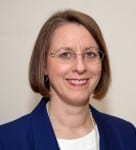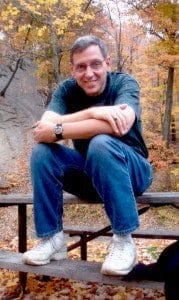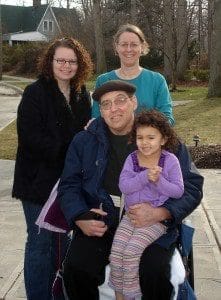
Relationship and Marriage Coach Susanne M. Alexander has been a widow for about 18 months. Her husband, Craig A. Farnsworth was just 57 years old when he passed away of brain cancer. They were married for 10 years, a second marriage for both of them. Alexander has one child and 3 stepchildren, all adults and married, with 3 grandchildren.
The couple started a relationship and marriage education company together, Marriage Transformation, LLC (www.marriagetransformation.com; www.bahaimarriage.net), so part of her life adventure has been deciding whether to stay in this line of work, which Alexander has. In fact, she has decided to re-launch the business. In the weeks before he passed, she wrote and read to him a book to share his fact-based, spirit-guided approach to cancer called Empowered Healing, Creating Quality of Life While Journeying with Cancer. Alexander will start selling it as an eBook. She has completed a number of new relationship books since his passing as well.
One of the actions that was very helpful throughout Craig’s illness was doing blog postings to keep family and friends updated and connected to them. For Alexander, it helped them to process such a huge experience.
“He also encouraged me to blog after his passing so people would know how I’m doing,” she tells us. “It’s been helpful with grieving and with processing all the changes.”
You can follow her blog at www.myboatride.blogspot.com.
We recently conducted a Q&A with Alexander, who currently lives in Euclid, Ohio, a suburb of Cleveland, to discuss Marriage Transformation; talk about her experience of becoming a widow; as well as share some of her advice for people who are divorced, widowed, or separated today.

PBT: Can you tell us a little about your own personal experience of becoming a widow?
Alexander: Craig was diagnosed in July 2007 with glioblastoma, a very advanced and serious form of primary brain cancer, but in the motor area and close to the surface. We were blessed with two years until he passed, which gave me and the family time to adjust to the likelihood of this being the end of his life here. There was time to put our paperwork and finances in order, say whatever we needed to say, and spend quality time together.
We are members of the Bahá’í Faith, which gives us confidence in a life after this and an ongoing connection between our souls, even though Craig is no longer physically with me. Throughout the two years, an interfaith study circle based on the Bahá’í teachings about life, service to others, prayer, and the eternal journey of the soul met at our home. While Craig really wanted to stay here, he was also very aware that he was having a spiritual experience and his soul would go on. All of this helped to make the transition to widowhood easier.
Even with all of these experiences, however, I’ve felt grief, anger, and loss. I feel Craig close to me when I pray or need help, which is a blessing. However, he’s not here to hug, pay the bills, or discuss issues with. I get annoyed at his absence when there is a heavy box to carry, I have to eat by myself, or I’m stuck on a problem and need someone to talk to.
One of the most difficult transitions has been with my work. Craig and I established Marriage Transformation and worked together as coaches and presenting workshops, even though he also had another full-time job. I spent the first months after he passed questioning whether to even stay in this field. It took a few confirming experiences as I experimented with working alone to help me realize that I still feel passionate about helping people establish strong, happy marriages.
I’m now back creating and launching new materials and books. I’m also back doing workshops and speaking at conferences to both singles and married couples. There is some grief as I share with audiences about my marriage and my transition to being unexpectedly single again, while at the same time doing knowledge and skill-building with them. However, Craig’s insistence that we honestly share our experiences with friends and family while he journeyed with illness and dying carries on now as I create a deeper level of emotional connection with participants by honestly sharing my own journey.
One of the books, Empowered Healing, Creating Quality of Life While Journeying with Cancer, was written in the weeks just before Craig passed to share our voices detailing the positive path Craig took in his approach to cancer. It’s now been endorsed by Dr. Bernie Siegel (author of Love, Medicine, and Miracles).
PBT: How were you able to cope with this experience?

Alexander: Two weeks after Craig passed, my granddaughter Giuliana was born in Florida. Spending time with her and in the sunshine over the months since has been healing and joyful.
I was previously divorced, and that transition was honestly more traumatic than becoming a widow. So, that perspective helped. I was also very determined not to become “non-functional”. When facing new experiences, I tend to read books, so I went through a number of books for widows and found most of them unhelpful. I just have to go through this process of healing one day at a time.
A counselor advised me to let the feelings flow in the early months, that suppressing them would cause me problems later. So, I pounded on the bed when I got angry, yelled in the shower, cried as I needed to, and kept a daily journal of letters to Craig. I used music for relaxation and movement and listened to visualization CD’s.
I had the blessing of friends in Florida offering me their vacation home free of charge for a few weeks, so being at the beach and away from home helped. I had friends close by there for an occasional dinner, but I appreciated the quiet time alone in a beautiful setting. I did my best to keep my nutritional level up so I wouldn’t lose weight.
We had converted our prayer/guest room into Craig’s bedroom, and that’s where he passed. When I returned home, it helped to have it back as a prayer room and spend time in there daily as needed…which I still do. Grief really is an organic process, so it doesn’t proceed in a linear fashion. Some weeks I think it’s all done, but then there is an incident or memory that triggers tears.
Q: How did your friends, relatives, co-workers, and neighbors treat you during this difficult time?
Alexander: Friends and family checked in with me regularly in the beginning, but then went back to their normal lives of course. However, it’s been helpful that my late husband’s family has stayed in touch, still including me in family gatherings such as Thanksgiving and Craig’s daughter’s wedding. We are committed to be family in spite of his passing, and stay in touch via phone, email, and Facebook.
To help me, I initiated a monthly Bahá’í-based grief support group in my home, as there were others I knew going through the passing of loved one at the same time. That ran until after we had all passed the first anniversary times.
Close friends have regularly checked in with me to see how I’m doing. I still get regular cards in the mail from one. People who knew us from our Marriage Transformation newsletter have stayed in touch by email.
Craig became good buddies with our next door neighbor. That has been a blessing, as he has helped with lawn mowing, snow removal, and repairs.
PBT: How has your past influenced you as the person you are today?
Alexander: My parents gave me a good spiritual foundation. My first marriage gave me many opportunities to learn to deal with difficult problems with strength and perseverance.
PBT: What drives you today and how do you maintain this drive?
Alexander: I’m committed to being of service to help the transformation of individuals, relationships, and marriages, with a special focus on character. A lot of my drive comes from being a Bahá’í, since the “betterment of the world” is part of its foundation. In addition, there have been enough divorces among my my family and friends to keep me motivated in the marriage field for a long time to come! Going forward each day takes prayer, trust that my husband is in guardian angel mode somewhere close by, and hope for the world.
PBT: What do you think are some of the most difficult issues facing people who are divorced, widowed, or separated today?
Alexander: There are so many issues that arise with not having a partner. Loneliness is clearly a challenge at times, along with whether to pursue another partner. There is healing from whatever has led to being alone. Finances can be a struggle. Health issues can be more common. It’s hard to make decisions alone at times.
PBT: What advice do you have for those who are recently divorced, widowed, or separated to help them move on to the next phase of their life?
Alexander: I’ve found it beneficial to choose a few character qualities to focus on strengthening throughout. For widowhood, “acceptance” and “resilience” have been my watchwords. Following divorce, qualities to choose could be confidence, peacefulness, or self-respect. For someone who is separated, they could be faithfulness, honesty, or patience.
PBT: Who has inspired or motivated you in your life?
Alexander: My parents have stayed active and serving others on into their 80’s. Craig’s example of service, love, and caring for others, making friends, and spiritual connection all continue to influence me. I’ve had a number of writing mentors who have encouraged me along the way.
PBT: Do you have a motto or phrase that inspires you?
Alexander: Before my husband passed, I asked him what he wished for me. I keep his answer up as a poster on my desk: Fulfilled, Happy, Creative, Contributing.
For more information on Susanne Alexander, you can reach her at Susanne@marriagetransformation.com. You can also follow her on Twitter; connect with her on LinkedIn; or like her business on Facebook..





